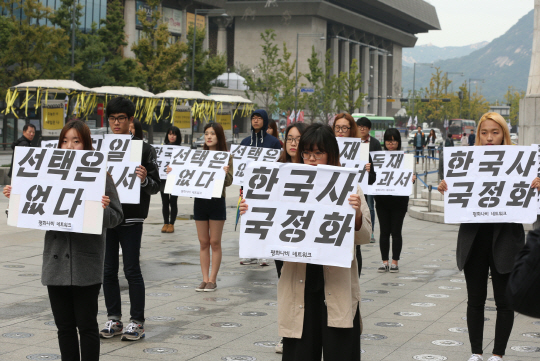Regardless of sex or age, government designated history books have recently become a hot issue with all Koreans as the nation’s top politicians have decided to push ahead with the plan to re-write history. The decision is marred in a lot of controversy. We only need to walk the streets of Seoul, to see many people taking part in protests against this policy. In many classes at school, this topic is being discussed, including our universities. According to a recent poll, the number of opponents (46%) was higher than that of supporters (36%). So why is the issue so controversial? The Dankook Herald (DKH) investigated this government designated history textbook policy in more detail.
It is important to think seriously about the pros and cons between government administration and authorization of a textbook in order to understand the differences. On the one hand, government administration of a textbook means the country has copyright and focuses on developing the subject by including topics associated with national unity. On the other hand, government authorization of a textbook means the books are written by private company and the government simply verifies the content for potential errors.
Since the formation of our first democratic government, the process of history textbook publication changed every time the administration changed. A government designated history textbook was used for a long time during the Park Chung-hee regime after the October Revitalizing Reforms. However, the Kim Dae-jung administration changed it from a government administered textbook to an authorized one in an attempt to escape a uniform version of history education in 2011 in the 6th Curriculum. The DKH investigated the publishing methods of educational textbooks in other nations and we learned there were 4 methods commonly used. They include a government-designated textbook, authorized textbooks, recognized textbooks, and a free issue system. First, a government-designated textbook means that it is created by the Education Ministry for use in schools. Currently, the textbooks of our elementary schools fall under this category. Second, authorized textbooks are published by publishing companies and authorized for use by governments. Third, recognized textbooks are curriculum books created by publishing companies for the government. Korean, society, ethics and history textbooks are authorized textbook while English, math, and science textbooks in middle and high school are recognized textbooks. Lastly, the free issue system means allowing publishing companies to issue and edit textbook content more freely.
In the case of history textbooks, many nations are using a system which is a mixture of government-designated textbooks, authorized textbooks, recognized textbooks, and a free issue system. However, there are also some countries using only government-designated textbooks such as North Korea, Mongolia, and Sri Lanka.
To better understand the outcry about government-designated textbooks, the DKH interviewed Lee Ji-yeon (sophomore, Dept. of English Education) at Ehwa Women’s University who joined the movement against this policy. First, the DKH asked about the objections to this decision. “As the saying goes, ‘history is recorded by the winners’. For this reason I think textbooks will more likely be written by leading forces. Thus, a textbook including a variety of perspectives is needed and students must not fail to see the importance of this. However, if the government is going to make textbooks, there is a good chance the textbooks will not be included several historical facts. We should keep it at bay,” she said.
 |
| ▲ People including students are protesting against government-designated textbook policy. |
The DKH then asked her opinion about the merits and demerits of a designated textbook in any other subject than history. “If an English textbook is going to be made by government, students have to study the same textbook, so when they are forced to study an identical book, instructors should have ability to teach them content beyond what they find in the designated book,” she said.
The DKH also interviewed Prof. Lee Jae-ryung (Dept. of History) to investigate the situation in more detail. The DKH asked his thoughts about the government-designated textbook. “I oppose the government-designated history textbook. This action isn’t right in academia. It is illogical and doesn’t go along with the direction the rest of the world is heading. Government-designated history textbook became controversial because politicians who are responsible for writing textbooks are making this political. They are distorting history through the state used textbook. Considering the fact that we can understand our history accurately simply by looking at various aspect of the historical facts, these textbooks could disturb our thoughts by encouraging standardization,” he said. “This action doesn’t follow the world trend towards textbook either. Only countries that are under a dictatorship have government-designated textbooks such as North Korea, Cuba etc. We have to know that South Korea is the country that despite 36 harsh years of colonialism, and an independence movement against Japanese imperialism, never stopped moving forward and achieved not only the world’s fastest economic growth, but also a constant pursuit of liberal democracy,” he added.
The decision on whether or not to adopt government-designated textbooks has already been made. However, many people are clamoring against it by signing petitions, organizing protests, distributing hand-written posters, and rejecting the composition by professors. There is a saying that states, ‘education is a hundred-year-long-range plan. Textbooks are the basis of it. Education is the future of our country itself. That’s why we have to pay more close attention to the writing of our textbooks.
Yoon Ji-hyo, Oh Hyun-ji yoonjh8779@naver.com

![[Campus Magnifier] Let's Surf the Library!](/news/photo/202404/12496_1765_4143.jpg) [Campus Magnifier] Let's Surf the Library!
[Campus Magnifier] Let's Surf the Library!
![[Campus Magnifier] Let's Surf the Library!](/news/thumbnail/202404/12496_1765_4143_v150.jpg)





